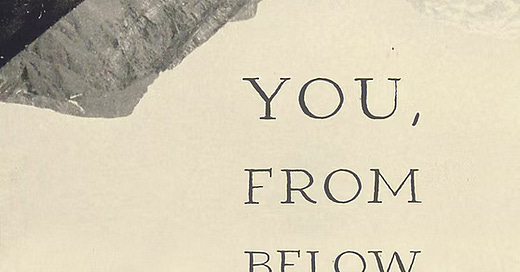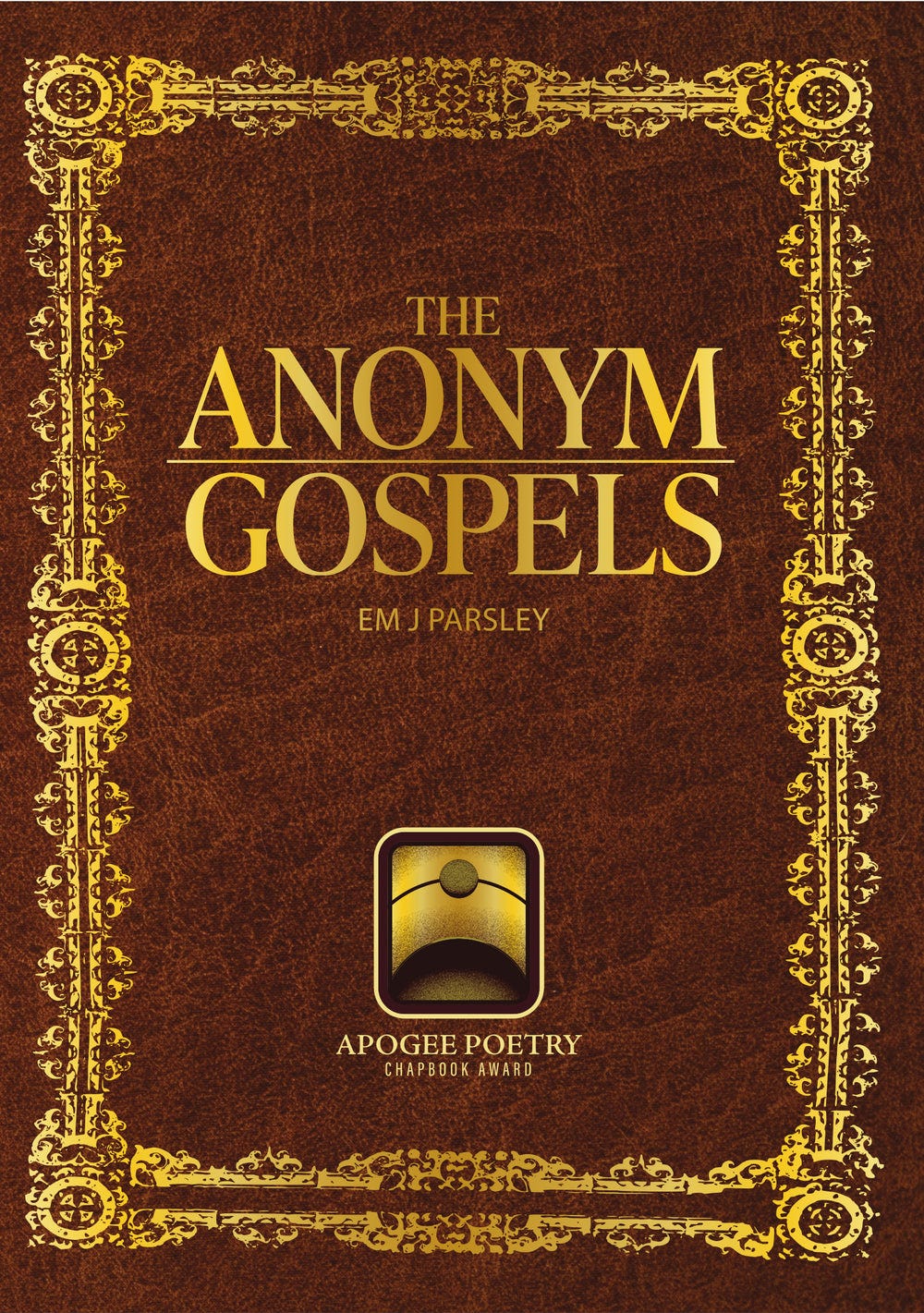a conversation with Em J Parsley, author of You, From Below
climate! queerness! a novella you don't want to miss!
Today’s Trans Poetica interview is a treat, y’all.
There are many things I could say about the current political climate (like the way the word “current” doesn’t feel quite accurate). I will keep it brief though, since it seems like the deluge of bad news is meant to keep us disillusioned. What we can do in this moment is get organized, be there for each other, listen to each other, speak out where and when we can, and truly find ways to resist and truly care.
It’s a privilege and a salve, always, to be able to dedicate time to writing and reading.
I’m especially excited to share this conversation about You, From Below by Em J Parsley, out with
tomorrow, February 4th. You, From Below is a gorgeous, lyrical ecofable that follows the protagonist “you” through Appalachia after their town has been swallowed into the earth. Through a cast of characters like a woman made of kudzu and a hive of bees, the protagonist learns a lot about loneliness and care.SG Huerta: When reading You, From Below, I felt the urgency of caring for the environment jumping off the page. What was the genesis of your novella?
Em J Parsley: I’ll be honest, I have a difficult time remembering the beginning moments of writing this book. I wrote the rough draft of it in a furious space of about two weeks in the summer of 2021, right after I finished grad school. I’m usually a slow writer—slow to formulate ideas and slow to formulate words. Things trickle in over the course of months or years, not days, but this time it came to me in a rush—the structure, the characters, the environment. 2021 was when I was really starting to formulate an urgent and active need to protect and advocate for Appalachia, which, like many other places, is in a state of environmental crisis, and looking back, I think this novella was my first attempt at putting that sudden internal urgency into words.
SG: Were there any particular climate crises that inspired the novella? While reading, I was viscerally reminded of my experiences living through Hurricane Helene and Winter Storm Uri.
Em J: The premise of the novella was not spurred on by one particular incident, although aspects of it were certainly influenced by the repeated pattern of watching underserved regions, whether it be Appalachia or Puerto Rico, get hit with climate crises and struggle with very little outside help for months and years afterwards. The penultimate chapter, “There Is Nothing Here,” was more directly inspired by my experience of Winter Storm Uri. I was living on my parents’ farm at that point, but they were away, taking care of my dying grandfather, and so it was just me, layers of snow and ice, the horses, and the chickens. I would go out every morning and evening to take care of the animals, and was otherwise inside, by myself, contemplating COVID, death, and my master’s thesis. Bleak! And yet I was completely safe and warm throughout the entire thing. I wasn’t aware of how still a place could be until then. It was the most silent and strange two weeks of my life.
SG: Each chapter features someone new the protagonist meets along their journey. Do you have a favorite character?
Em J: Oh, this is a great question. I’m partial to the man with the vulture head. I love the chimeric, or really anything that asks us to put aside our anthropocentrism. It’s useful for helping us to understand that we are a part of a larger ecosystem, and that an individual organism, individually, cannot survive. I also found his cadence fun to write, which is based on my foundational knowledge that old Appalachian people are always saying cryptic shit.
SG: I’m also curious about your writing process– did you have these characters in mind or write the book chronologically?
Em J: Everything about the writing process of this novella was opposite of what I usually do—I always start with characters and place, but this time around, I started with structure. There’s a refrain in the book— “rise and fall, rapture and decay.” I wanted the plot to mirror that structure. I wanted it to have spatial tension: as you climb the mountain, you are also rising and falling, inhaling and exhaling: landslides, raptures, claustrophobically tight spaces, never-ending open spaces. At the time I was really into the chiastic structure, which is an ancient storytelling structure where the events on either side of the “centerpoint” of the story ripple out, mirroring each other as they go. This novella isn’t quite chiastic, but it definitely uses that idea as scaffolding. In that sense, the characters came out of what narrative movement I was trying to create; for example, I wanted a chapter about rising, which turns into the idea of rapture, which leads to a chapter about an Evangelical Christian missionary in rural Appalachia, and so on.
SG: Could you talk about how the title came to you, and how you decided to write entirely in second person?
Em J: I think a lot about folktales—jack tales, specifically. The thing about jack tales is that often, when told orally, there’s this personalization to it. You can tell a jack tale to a child and insert that child’s name and life: “now one day Johnny boy was out hunting in them woods behind Nana’s house…” There’s a permeability there that I love. They can be stories with strict morals and have “be good or the monster gets you” type endings, but often Jack (or Johnny, or Julia) is a trickster, is morally grey, and still ends up on top. He’s such a funny little shadow of a character. I was interested in creating a shadow of character that was permeable yet real—not so “everyman” that they become no man, yet real enough that the “you” could really be you. I don’t know if I threaded the needle, but it was fun, and if you read You, From Below and don’t feel as though it’s got any part of you in it, that’s alright by me. I’m not trying to create a universal “you,” just one that’s malleable.
SG: What is your relationship with place in your writing? Specifically, could you talk about how Appalachia informs your work?
Em J: I am constantly confronted with the question of place. My place in the spaces I navigate feels precarious to me. I was born in Florida, my mom is from Kentucky, we moved here permanently when I was a teenager. I have come and gone since then, but I have always returned. I have spent time in various parts of Appalachia—largely Kentucky, but also North Carolina and West Virginia—and I think more than anything, I want to create a socially and ecologically complex image of my home. As a queer person, it’s not uncommon for people’s reaction to hearing that I live in rural Kentucky to be sympathetic, like, “oh no, that must be hard for you.” I understand why—there’s a narrative of danger and fear and loneliness when it comes to rural queerness, and maybe specifically rural Appalachian or Southern queerness, and I know a lot of queer people who have grown up in similar spaces to me who do feel that these spaces are not for them, and have had to move away because of it. I have gone through periods where the isolation and fear was stronger than my desire to stay. I also have the privilege of being white in these spaces, and people often assume I am a cis woman, which, while being a rough blow to my trans-nonbinary-they/he self, does make some situations easier to navigate.
All of this preface is to say that I love my home. I believe in the goodness of my neighbors. It is complicated and weighty to know that some of your neighbors do not believe in your goodness. It is not a naive hope, and maybe one day enough bad experiences will grind me down to grimness, but for now I am defiantly hopeful. I want fellow Appalachians who have a tie to their home but have felt that their home does not love them to know that their home does love them. The land loves you, many of the people love you, and this can be your place if you want it to be, but only if we keep it alive—and much of it is in danger of dying.
SG: Following that thread, much of You, From Below describes human loneliness and solitude. The Landslide chapter includes a moment of romance among the destruction. What was writing this juxtaposition like?
Em J: Oh, I really loved writing “The Landslide,” so I’m happy to hear it stuck with you. In a book that grapples with that loneliness, I felt it essential to also have moments where there is true connection. The fact that it is romantic is nearly irrelevant to me. It’s more that the “you” of the story allows themself to feel tied to someone for the first time in the narrative. You look someone in the eye and say “I am real, you are real, there is a thread connecting me to you, and that matters.” We live in a society that seems to be destroying at a faster pace than we could ever hope to create and regenerate. It’s important to remember that we are capable of rebuilding both relationships and places, and that both of those things must be done collectively if we have any chance at succeeding.
SG: The intersection of class and environment is a recurring theme in You, From Below, as well as community and what we owe each other and the earth. How does fiction help you as a writer work through these themes?
Em J: I guess it’s sort of like problem-solving, for me. I’m trying to puzzle out these big issues, like you say—what do we owe each other? How can we help each other? How can we help the earth?—but they’re such overwhelmingly big questions, that I have to take it one person, one plant, one patch of dirt at a time in my day-to-day life, and one story or character at a time when I’m writing. I love Ursula K. Le Guin—I just finished reading The Dispossessed—and one of the things I love about reading her work is that it feels imaginatively complete. What would a future anarchist society look like, she asks? Well, let’s puzzle it out in the form of fiction. I think it’s the easiest way for my brain to process those ideas.
SG: You also recently published a poetry collection, the anonym gospels. Could you talk about your relationship to genre?
Em J: Genre, my old nemesis. Here’s the short history: I have been writing stories since I could write enough words to put together a story. I didn’t touch poetry until grad school, where they made me eat my vegetables, and it turns out vegetables taste great. I had a torrid love affair with poetry, fiction felt very hurt and neglected, I thought maybe I would never love fiction again, and then I met my incredible thesis advisor, Sylvia Aguilar-Zéleny, who told me a secret: you can do both. You can merge them. You can do whatever you want. Fiction is poetry and poetry is fiction and stories are everywhere and anything can be a poem… Hm. That last one actually isn’t true to me, not anything can be a poem, but anything that you shape into a poem can be a poem. I don’t know if that answered your question, but it’s all I’ve got.
SG: That answered my question perfectly! What is next for you and your writing?
Em J: I’m currently most interested in merging my ecological/agricultural, community, and creative practices. I work on a farm that is currently attempting to fully integrate agroforestry practices and provide regenerative farming and agroforestry education to our region. I’m excited to see where that goes, and I’m excited to incorporate my artistic practices into that education. I’ve been expanding my artistic practice lately–I’ve been working a lot with natural dyes and fiber craft, as well as getting back in touch with my traditional music and dance roots. I’m looking forward to seeing how that all inevitably crashes into my writing practice at some point down the line. You’ll also be shocked to learn I’m currently writing another Appalachian gothic novella that I’m hoping to begin looking for a publisher for this spring. It’s an aesthetic and political statement I can’t escape from, it seems, but I’m alright with that.
Em J (also known as Wylde) Parsley is a farmer and environmentalist living in rural Kentucky. Their work has appeared in ANMLY, Silk Road Review, Birdcoat Quarterly, and various other publications. He is the author of the poetry chapbook, THE ANONYM GOSPELS (April Gloaming Publishing, 2024), which won the Apogee Poetry Chapbook Award.
I cannot wait for that Appalachian gothic novella to hit the shelves. In the meantime, you can order YOU, FROM BELOW here.
Register for the virtual book launch on February 4th at 7pm CT here.
Learn more about Em J’s in person reading at Carmichael’s Bookstore in Louisville, KY on February 7th here.
ICYMI:
is also open for short story/flash fiction manuscripts until March 1!Now for the housekeeping: you can find past Trans Poetica interviews here! Feel free to get in touch if you want to collaborate in any way— QTPOC to the front always <3 If anyone has thoughts on substack alternatives, let me know that too porfa!






this book sounds so good😭
love this!